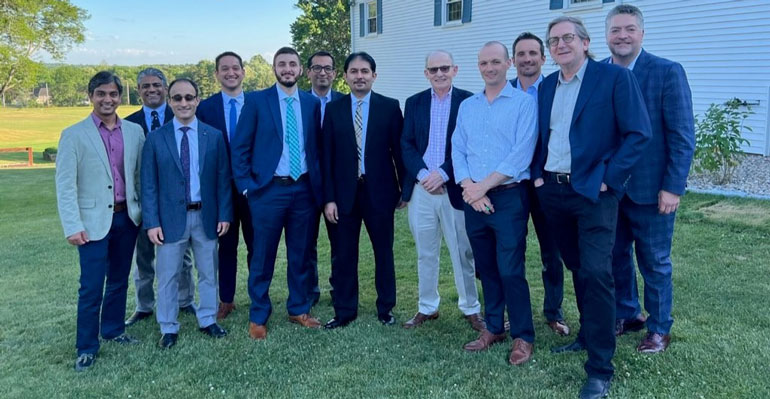
PREAMBLE
Given the inherent stressors of medical training, it is critical for any program to provide an environment that fosters professional, physical, psychological and social well-being of its trainees. At Hartford Hospital we take this matter very seriously and ensure consistent messaging and provision of ample opportunities to our trainees in this regard. We believe that training of medical graduates must occur in the context of a learning and work environment that emphasizes a commitment to the well-being of learners, faculty members, and all members of the educational and healthcare team. Psychological, emotional and physical well-being are critical to the development of a competent, caring, and resilient physician. In addition, well-being requires that physicians retain the joy in medicine while managing their own real life stresses. At Hartford Hospital we are committed to providing a safe environment for patients, learners, faculty, and staff.
The creation and maintenance of a positive learning and work environment and a culture of respect and accountability for well-being is crucial to a physician’s ability to deliver the safest best possible care to patients.
Our program promotes well-being and believes that it is a critical component of a healthy working environment. We understand the importance of a healthy work-life balance to minimize the levels of fellow burnout. Our program is committed to creating and fostering activities that promote the development of well-rounded physicians.
Our division regularly organizes off-campus recreational activities for the house-staff and their families. The fellows are encouraged to participate in these social gatherings. This provides opportunities for the trainees to gel with their peers and faculty as colleagues in a relaxing, stress-free environment and let loose outside of work. Events in the past have included apple picking, skiing, hockey games, mini golfing, dinners/happy hour and more. There are funds dedicated to use for fellow well-being.
Some of the other steps taken in this regard include:
- Selection of a fellow every 4 months as the “well-being champion”
- Ergonomic workstations
- Overhauling of the fellows’ room
- Photo contest
- Bowling or other outdoor activities etc.
- Fitness challenges
- Pet visits
- Safe zones (faculty and coordinators provide confidential judgement free support)
INDIVIDUAL RESPONSIBILITIES
- Fellows and faculty members have a professional responsibility to appear for work appropriately rested and must manage their time before, during and after clinical assignments to prevent excessive fatigue.
- All fellows and faculty members should be aware of the behavior and conduct of other team members. If a fellow or faculty member observes physical, psychological or emotional problems affecting the performance of a fellow or faculty member, including impairment due to fatigue, they should immediately notify their program director or supervising faculty. Likewise, fellows and faculty should alert the program director, the Office of Graduate Medical Education, or other appropriate supervisor if they are concerned that another fellow or faculty member may be displaying signs of burnout, depression, substance abuse, suicidal ideation, or potential for violence.
- If a fellow is experiencing problems, they are encouraged to voluntarily seek assistance before clinical, educational and professional performance, interpersonal relationships or behavior are adversely affected. Fellows who voluntarily seek assistance for physical, mental, emotional and or personal problems, including drug or alcohol misuse, before their performance is adversely affected, will not jeopardize their status as a fellow by seeking assistance.
- Fellows must maintain their health through routine medical and dental care and (if needed) mental health care. Non-urgent appointments should be scheduled in advance in accordance with the program and institutional leave policies. At no time will fellows be denied visits for acute care of illnesses (physical or mental) or dental emergencies during work hours.
PROGRAM RESPONSIBILITIES
- Our program promotes practices that enhance the meaning that each fellow finds in the experience of being a physician, including protected time with patients, minimizing non-physician obligations, providing administrative support, promoting progressive autonomy and flexibility, and enhancing professional relationships.
- Our program promotes practices and behaviors among faculty, staff and learners that enhance a positive learning and work environment including:
-
- Clear and consistent expectations.
- Consistent and effective feedback.
- Respect for divergent opinions and positions.
- A fair and accurate system for performance assessment.
- The ability of all to express concerns or divergent opinions without fear of retaliation or intimidation.
- Expectations for emotional self-regulation.
- Solicitation of and respect for the input, recommendations, and concerns of trainees.
- Program constructs schedules that are not unduly burdensome with work intensity or compression.
- Program provides opportunities for excessively fatigued fellows to take therapeutic naps and provide sleep space or alternative transportation if a fellow is too tired to drive home following clinical duties. If a fellow accesses public transportation to arrive home safely, they can provide receipts for one-way or round trip fare to the Office of Graduate Medical Education for reimbursement.
- There are circumstances in which fellows may be unable to attend work, including but not limited to fatigue, illness, family emergencies, and parental leave. The program allows an appropriate length of absence for fellows unable to perform their patient care responsibilities.
- Our program has policies and procedures in place that:
-
- Encourage optimal fellow and faculty member well-being.
- Ensure coverage of patient care in the event that a fellow may be unable to perform their patient care responsibilities. These policies must be implemented without fear of negative consequences for the fellow who was unable to provide the clinical work.
- Ensure compliance with clinical and educational work hours.
- Ensure progressive levels of supervision that promote patient safety, autonomy, and flexibility.
RESOURCES
UConn School of Medicine Graduate Medical Education is committed to supporting the well-being of all our residents and fellows during their training program. For a full list of resources offered through UConn Health, the Capital Area Health Consortium and the broader community, please visit: